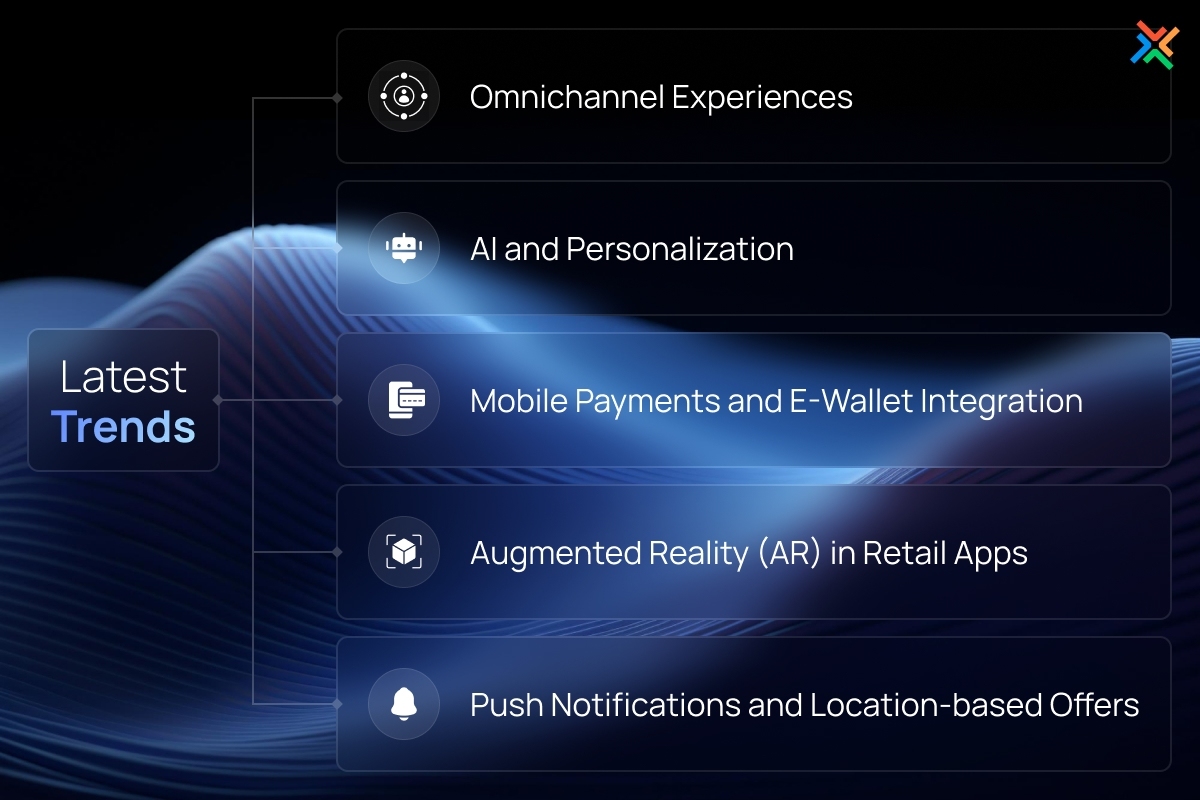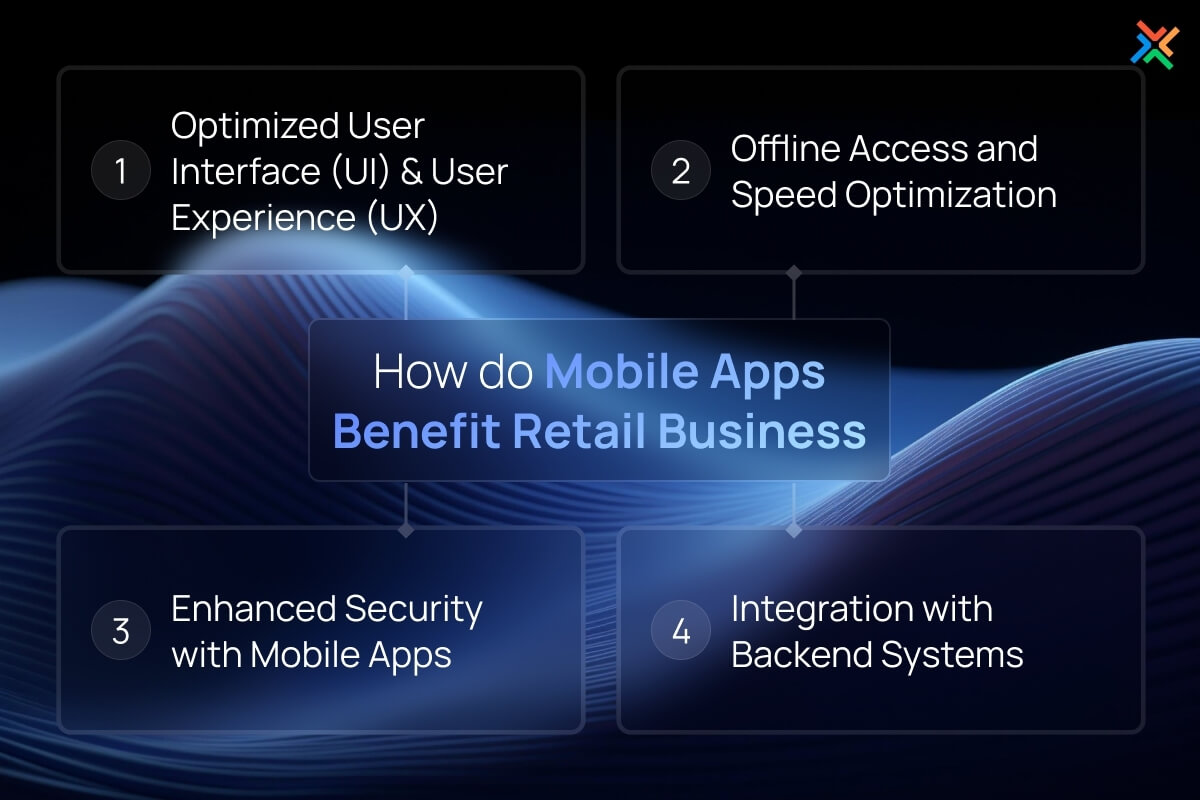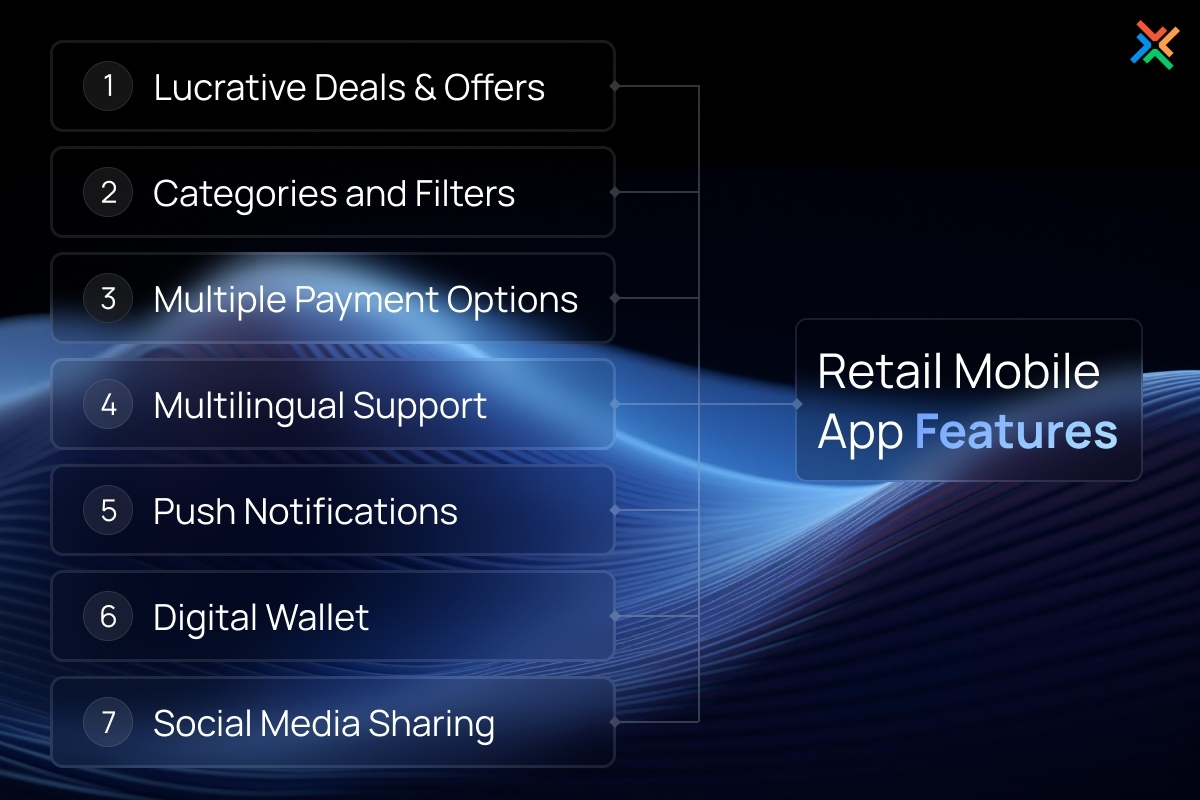Why Mobile Apps Are Essential for Retail Business Growth
October 04, 2024

Ayush Kanodia
.jpg?w=1920&q=75)
In recent years, the way we shop has undergone a massive shift, with mobile devices becoming an essential part of the retail experience. With smartphones reaching over 90% penetration in the UAE and commanding a strong presence in global markets, retail has evolved to meet customers where they are—on their phones. As businesses, we’ve seen this shift firsthand, as more shoppers now prefer browsing and purchasing through mobile apps than any other platform.
Mobile apps offer unmatched convenience. Whether it’s quickly checking product availability or making a purchase in just a few taps, apps have simplified the shopping experience in ways traditional methods never could. Customers no longer need to wait in lines or search through endless websites; everything they need is accessible right in their pocket. This ease of use has fueled the surge in mobile app downloads and engagement across the retail sector, especially in markets like the UAE where consumers are highly connected.
In this blog, we’re going to understand how mobile apps have become a crucial part of driving retail growth. We’ll explore the latest trends, the technical benefits of apps, and why businesses—big or small—are turning to mobile to stay competitive. Let’s take a closer look at what’s behind this shift and how it’s shaping the future of retail.
Current Trends in Retail Mobile App Development
As mobile apps continue to shape the retail experience, certain trends have come up that businesses need to stay on top of. These trends improve how customers interact with brands, at the same time, making the shopping journey more engaging and efficient. Let's walk through some of the key developments we’re seeing in retail mobile app development in the UAE today.

Omnichannel Experiences
One of the biggest shifts we’ve seen is the integration of mobile apps with in-store experiences, creating a more fluid shopping process. Retailers are blending online and offline touchpoints—customers can check product availability in a store, place orders through the app, and pick them up on-site without a hitch. Some businesses have even taken it a step further with features like in-app navigation to guide customers to products inside the store. It’s all about giving customers the flexibility to shop the way they prefer, whether they’re at home or visiting a physical location.
AI and Personalization
Artificial intelligence has really made its mark on retail apps, especially when it comes to personalization. Apps are now smarter than ever, using customer data to offer personalized product recommendations and targeted promotions based on individual shopping behaviors. This isn't just about tracking clicks—it’s about learning from every interaction to suggest what a customer might actually be interested in. By doing so, brands can offer more meaningful and relevant experiences that keep users coming back.
Mobile Payments and E-Wallet Integration
Another game-changer has been the advent of mobile payments and e-wallets. Customers are ditching traditional payment methods and adopting mobile options like Apple Pay, Google Pay, and various in-app wallet solutions. These features simplify transactions and add an extra layer of security, making checkout faster and more convenient. In regions like the UAE, where mobile payment adoption is particularly high, offering these options can make a notable difference in customer satisfaction.
Augmented Reality (AR) in Retail Apps
Augmented reality is becoming a key part of the retail app experience. From virtual try-ons to 3D product previews, AR is changing the way customers interact with products. Whether someone is trying on clothes or visualizing furniture in their home, AR helps bridge the gap between online shopping and real-world decision-making. It’s all about offering customers a hands-on feel without them having to leave their homes.
Push Notifications and Location-based Offers
Lastly, we can’t ignore the potential of personalized push notifications and location-based offers. With geofencing, apps can send targeted promotions when customers are near a store or even inside it. This real-time engagement makes it easier for businesses to capture impulse purchases and keep customers engaged. Well-timed push notifications, like a reminder about a sale or a restocked item, can go a long way in driving sales and improving retention.
Technical Advantages of Mobile Apps for Retail Businesses
As we dig deeper into the role of mobile apps in retail, it’s clear that beyond just trends, there are some solid technical benefits that make mobile apps the go-to solution for businesses. Let’s break down a few key advantages that make apps more effective than other digital platforms, especially when compared to mobile websites.

Optimized User Interface (UI) & User Experience (UX)
One of the biggest draws of mobile apps is the control we have over the user experience. Mobile app development firms design apps to run smoothly and deliver a more intuitive experience compared to mobile websites, which often have to deal with browser limitations. With an app, we can create layouts and navigation that are tailor-made for mobile devices, leading to faster loading times, fewer distractions, and overall, a more fluid experience. Users can easily swipe through product categories, filter options with precision, and complete their purchases with minimal hassle.
Offline Access and Speed Optimization
Another technical perk of mobile apps is the ability to provide offline access to certain features. While a website needs a constant internet connection to function, apps can cache data and allow users to browse products or even make purchases offline. This is a game-changer, especially in areas where connectivity might be spotty. Apps are also optimized for speed—by preloading content and using local storage, they can respond faster to user actions, making the shopping experience feel more hassle-free and satisfying.
Enhanced Security with Mobile Apps
Security is a critical factor for any business, especially when it involves customer transactions. Mobile apps come with effective security measures such as encryption, secure payment gateways, and even biometric authentication like fingerprint or face recognition. These features help build trust with users, who know their personal and payment information is well-protected. In a world where data breaches are a real concern, this level of security sets mobile apps apart and gives customers peace of mind while shopping.
Integration with Backend Systems
Mobile apps also shine when it comes to integration with backend systems like CRM, ERP, and inventory management. These integrations allow businesses to keep everything running in sync—from tracking customer interactions to managing stock levels in real-time. This makes it easier to offer personalized experiences, track orders, and respond quickly to changes in inventory. For businesses that already have complex systems in place, a well-designed app can serve as the bridge between the front-end customer experience and the back-end operations.
Key Features of a Successful Retail Mobile App
Now that we’ve covered the technical advantages, let’s look at the essential features that can make or break a retail mobile app. These are the elements that help improve the customer experience, boost sales, and keep users coming back. A well-rounded app isn't just about great design—it’s about offering the right features that address both customer needs and business goals.

User Account and Personalization
A successful retail app starts with the basics - user accounts. By allowing users to create profiles, the app can store valuable data like preferences, purchase history, and wish lists. This data, in turn, powers personalized recommendations that help customers find what they’re looking for more easily. Whether it’s suggesting items based on past purchases or reminding them of saved wish list products, personalization helps create a more engaging and relevant shopping experience.
Flawless Checkout Experience
Nobody likes a complicated checkout process, and one of the quickest ways to lose a sale is by making payment too much of a hassle. Features like one-click checkout, saved payment information, and support for multiple payment gateways make the buying process smoother. These conveniences not only save time but also reduce cart abandonment, ultimately boosting conversion rates. By making the checkout process frictionless, we can increase the likelihood that customers will complete their purchases.
Real-Time Inventory Updates
Accurate stock information is crucial for a good shopping experience. There’s nothing worse than selecting a product only to find out it’s out of stock at the last minute. By integrating the app with inventory management systems, we can provide real-time updates on product availability, preventing customer frustration. This also gives businesses the ability to notify customers when items are restocked, keeping them engaged and more likely to make repeat purchases.
In-App Customer Support
Great customer support can make all the difference in how users perceive a brand. Retail apps with built-in support features like chatbots, FAQs, and live support offer a quick and easy way for customers to resolve issues without leaving the app. Whether they need help with a product or have questions about an order, providing immediate assistance enhances the overall user experience and keeps customers satisfied.
Loyalty Programs & Rewards
Loyalty programs are another key feature that can help retail businesses build long-term relationships with customers. By integrating rewards programs directly into the app, users can easily track points, redeem rewards, and take advantage of exclusive offers. These incentives not only encourage repeat purchases but also strengthen brand loyalty. A well-designed loyalty program can turn occasional buyers into regular customers, driving steady revenue over time.
Case Studies: Success Stories of Mobile Apps Driving Retail Growth
Now, let’s look at some real-world examples of how mobile app development companies in the UAE have made a notable impact on retail businesses. From global giants to smaller local players, mobile apps have proven to be influential in driving sales and increasing customer engagement.
Big Retail Brands Leading the Way
When we think of retail success stories in the mobile space, brands like Amazon and Walmart immediately come to mind. These industry giants have mastered the art of using mobile apps to connect with customers and optimize the shopping experience.
Take Amazon, for instance. Their app not only makes it incredibly easy for users to browse millions of products but also offers features like personalized recommendations, one-click checkout, and real-time delivery tracking. The result? Amazon has become the go-to app for shoppers worldwide, with mobile sales contributing a big chunk to their overall revenue.
Closer to home, Walmart has also adopted the mobile-first approach. Their app integrates with in-store experiences, allowing users to scan products for prices, check availability, and even complete purchases through mobile payments. With features like curbside pickup and delivery scheduling, Walmart’s app has become a vital tool for modern shoppers. These innovations have played a huge role in Walmart’s continued growth, particularly as mobile commerce becomes more widespread.
Even in the UAE, we’ve seen local success stories like Carrefour UAE. Their mobile app offers everything from grocery shopping to loyalty rewards, making it easy for customers to shop on the go. With user-friendly features like mobile payments, product filtering, and personalized offers, Carrefour has seen a considerable increase in mobile-based transactions, reinforcing the importance of a strong app presence in today’s market.
Small Retail Businesses with High Mobile ROI
It’s not just the big players that are benefiting from mobile apps. Many smaller retail businesses have seen a remarkable return on investment (ROI) by adopting mobile solutions.
Take The Little Flower Shop, a boutique florist that developed a simple mobile app to allow customers to order flowers with ease. The app included real-time inventory, personalized recommendations for special occasions, and loyalty rewards for frequent buyers. By making the ordering process more convenient and engaging, the shop saw a noticeable increase in repeat customers and a spike in mobile sales, proving that even smaller businesses can compete with the big names.
Another great example is Nad Al Sheba Bakery in Dubai. They launched a mobile app offering customers a way to order baked goods for delivery or pickup. With features like push notifications for daily specials and mobile-exclusive discounts, the bakery was able to tap into a new audience, boosting both sales and brand awareness. Their investment in mobile technology paid off quickly, showing that a well-designed app can work wonders for customer retention and growth.
The Role of Mobile App Development in Retail Success
As we’ve seen from the case studies, mobile apps have become an essential part of retail growth. But not all apps are created equal. When it comes to developing a successful retail app, there’s a clear advantage to going the custom route rather than opting for off-the-shelf solutions.
Custom App Development - Why It’s a Better Fit for Retail Businesses
While off-the-shelf solutions can seem tempting due to their lower upfront costs and faster implementation, they often fall short in the long run. Custom mobile app development allows us to build solutions that are specifically designed for a business’s unique needs. From incorporating branding elements to creating personalized features that reflect how customers interact with the business, a custom-built app offers far more flexibility.
With a custom app, we can also integrate the exact backend systems you need, from CRM to ERP, and customize the user experience to suit your customers. This personalized touch often leads to higher user satisfaction, stronger customer loyalty, and ultimately better results for the business. Off-the-shelf solutions, on the other hand, might offer standard features but often lack the scalability or customization needed to grow with the business.
Choosing the Right Tech Stack to Build Apps That Fit Your Business
When it comes to choosing the right technology stack for mobile app development, it’s important to consider the platforms your customers are using. In retail, that usually means developing apps for both iOS and Android. While native apps (built specifically for one platform) provide the best performance and experience, cross-platform frameworks like React Native offer a cost-effective way to build apps that run on multiple platforms without sacrificing too much in terms of quality.
At WDCS Technology, our experience includes working with a variety of technologies, whether it’s building high-performance native apps or developing cross-platform solutions that offer flexibility and faster deployment. We choose the right tech stack based on your business needs and goals, making sure that the app not only looks good but also performs reliably.
Our Expertise in Retail Mobile App Development
At WDCS, we’ve been helping retail businesses with mobile app development solutions that not only meet customer expectations but also drive growth. Whether it’s designing user-friendly interfaces or integrating complex backend systems, our approach is to build apps that are practical, scalable, and optimized for retail operations.
One of our success stories is Aswaaq Online, a grocery delivery platform we developed to bring the convenience of online shopping to customers in the UAE. With features like account syncing between online and offline stores, loyalty points integration, and ERP synchronization (using Microsoft D365), we’ve created an app that serves both customers and merchants seamlessly. Users can shop, schedule pickups, and earn points through both their online and offline purchases. At the same time, the admin interface allows merchants to run multiple promotions and keep inventories updated in real-time.
The success of Aswaaq Online is a testament to how our custom mobile app development approach helps businesses tap into the growing demand for mobile-first retail solutions.
The Cost of Not Adapting
As we've explored, mobile apps are revolutionizing the retail industry. Retail businesses that don’t invest in mobile app technology are at serious risk of falling behind. Whether it’s losing sales to more tech-savvy competitors or missing the chance to connect with mobile-first customers, the cost of not adapting is real.
One of the biggest dangers of sticking with outdated technology is the increased risk of security breaches. As hackers become more sophisticated, older systems become more vulnerable to attacks. This not only puts your customers' sensitive information at risk but can also lead to hefty fines and a damaged reputation.
As technology advances, older systems can struggle to integrate with newer platforms and software. This can lead to compatibility problems, disrupting data flow and slowing down critical business processes. When your systems can't communicate effectively, it creates inefficiencies that impact your bottom line.
Outdated technology is often less reliable and more prone to breakdowns. When your systems are constantly crashing or experiencing bugs, it takes a toll on employee productivity. Valuable time is wasted troubleshooting issues instead of focusing on core business objectives.
Let’s Talk About Your Mobile App Needs
At WDCS Technology, as a trusted mobile app development company in the UAE, we’ve helped countless retail businesses within the country and beyond develop mobile apps that drive growth, improve customer engagement, and increase sales. If you’re looking to stay competitive and provide the mobile experience your customers expect, let’s have a conversation. Reach out to us for a consultation, and we’ll work with you to build a winning mobile app.
Drive growth and enhance customer engagement for your retail business with a custom-built mobile app from WDCS.
Stay ahead of the competition with a state-of-the-art mobile app from WDCS. From product catalogs and secure payments to personalized recommendations and seamless checkout, our mobile app development services cover everything you need.